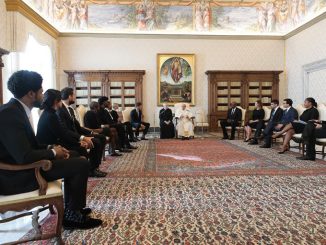GREENVILLE—Attendees at a recent conference on Catholic social teaching and the virtue of social justice, as well as the relevant actions people should pursue, were told they shouldn’t leave that responsibility to government.
Philip Nielsen, one of several speakers participating in the annual conference of the Center for Evangelical Catholicism held Sept. 21-22 at St. Mary Church, said social teaching starts with the family unit.
It is about human beings, as a group, and their role in building a society with a common goal or a common good, said Nielsen, director of research for the center.
“All of Catholic teaching on marriage and the family is actually Catholic social teaching,” Nielsen said.
An author who has written at-length on the subject, Nielsen said government has a natural tendency to gain more control from what the Church refers to as a “lower order”. It is addressed in the Catechism of the Catholic Church as the principal of subsidiarity, which states, in part, that “a community of a higher order should not interfere in the internal life of a community of a lower order.”
“It is natural for those in power to pull up the chain and for subsidiarity to diminish,” Nielsen said. “It’s also natural for the strongest to gain more power, and the weakest to lose power. As a society, we should know this.”
Nielsen said the Church views the virtue of social justice as inseparable from personal virtue, unlike government, which differentiates the personal from the social.
“Catholic social justice is a virtue of going out into society and working for the common good, a virtue of imploring the community to go out and better society” he said. “What we’re doing here today is practicing active social justice.”
Nielsen said steps must be taken to strengthen and empower the family unit, including passing laws at the local government level to strengthen the principal of subsidiarity and expanding school choice for parents.
“We’re so used to thinking that mandatory government schools is the natural way of doing things and that we get permission from the government to homeschool our children,” he said. “But the authority should go the other way. The ideal school choice is to empower the parents.”
Other speakers were Father Raymond J. de Souza, chaplain of Newman House at Queen’s University and pastor of Sacred Heart of Mary Church in Ontario, Canada; Nathan Schlueter, Ph.D., professor of philosophy and religion at Hillsdale College in Michigan; and Jay W. Richards, Ph.D., research assistant professor in the Busch School of Business and Economics at The Catholic University of America in Washington, D.C.
In his talk on how Catholics should respond to the issue of environmental stewardship and climate change, Richards urged the audience to be mindful of the politics currently clouding the science behind climate change.
Miscellany/Terry Cregar: Jay Richards, Ph.D., left, talks with Allen Nielsen during a break at the Center for Evangelical Catholicism’s annual conference at St. Mary Church in Greenville. Richards was one of four featured speakers at the event. Nielsen, a former principal at Charlotte Christian School in North Carolina, traveled from Charlotte to attend the conference.



